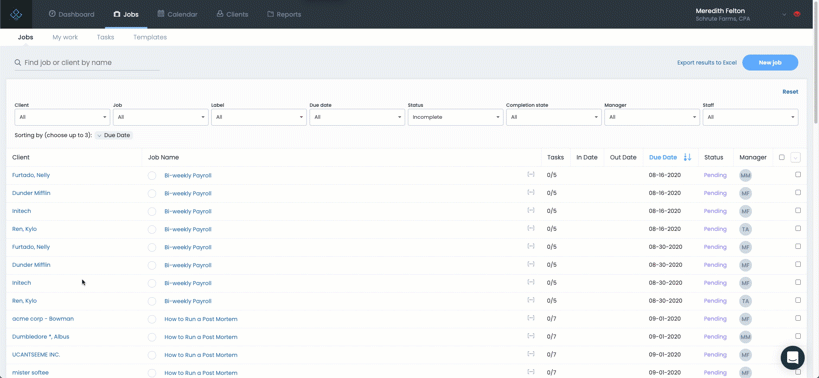3 Critical Learnings About What Makes a Good Manager

Think about when you first started your accounting firm.
You were full of energy and ambition to do accounting your way and find your kind of clients to live the life you wanted to live. You wanted to get close to your clients and do fantastic work for them.
And then, it happened.
You started getting high-paying ideal clients left-and-right. Your working hours started consuming your nights and weekends, and you definitely didn’t have any of the free time you hoped you’d have when you decided to start your own firm.
So, you hired additional help, invested in software and equipment, and gave yourself the gift of growth and a bit more free time back in your life. But in all of this growth, did you take time to learn what makes a good manager for your team?
Why Being a Good Manager is Important to Grow Your Firm
When it comes to our work, we all have our own strengths and weaknesses. And as a manager, you should focus your efforts on the things that you do best and delegate your weaknesses to other people or solutions to maximize your time. By taking on a workload that isn’t your strong suit, you risk becoming a bottleneck for your team and stunting your own firm’s growth.
There’s a healthy blend of soft and hard skills needed to be a great leader. Things like a sense of humor and confidence paired with the working knowledge of a bookkeeper can help a firm owner build an enviable enterprise.
Take recurring client work, as an example. It’s easy to say that you do X forms and tasks for X, Y, and Z clients every month; however, the workflows that make those recurring tasks possible shouldn’t be on your shoulders to implement.
Instead, you should be able to set up recurring tasks in a workflow tool to help automate that regular set of tasks for your team and track due dates in common intervals for accounting work, such as quarters or months.
Otherwise, if you’re a day late on assignments to your team, it could impact your team’s capacity or your client’s end deliverable.
Sure, it’s difficult to let go of responsibilities and tasks at first. But it’ll help you in the long run to be a better manager and own a better firm for your team and your clients.
Qualities of a Good Manager:
- Practice active listening
- Make space for your team to do their best work
- Recognize you don’t have all the answers
- Value your team member’s opinions and time
- Lead by example with a positive attitude and setting work-life boundaries
- Share information, ideas, and knowledge with your team as it pertains to the company’s goals and team objectives
- Support your team members
That’s not to say that every manager is good at all times. There are issues with all levels of leadership at companies large and small. But, most often, there are common issues employees face with their leaders everyday that you should avoid.
If You Want to Be a Good Manager, Avoid:
- Using manual processes and workflows.
- Keeping your team in the dark about key goals and milestones.
- Doing things the way they were done before you hired a team of experts.
Traits of a Good Manager
At this point in your firm’s history, you’ve built the processes and workflows that create your team’s workload and priorities. Being a great manager means that you orchestrate the people, processes, and workflows to play in symphony together. The best firms have all three working toward the same goals with a great manager leading the charge.
Step 1: Hire great people.
Maybe this one goes without saying, but you really need to have good people in place to do truly spectacular work for your clients. And more than that, you’ll be working with your team closely to achieve your goals.
Step 2: Manage processes.
This isn’t the same thing as doing the work. If a process seems cumbersome, unwieldy, or time consuming for your team or clients, it’s on you to fix that before it impacts your bottom line. This means investing in software, understanding what your team is up against on a daily basis, and staying close enough to the client work to notice when things start to break down due to increased workload, understaffing, or unrealistic deadlines.
Step 3: Automate workflows.
If you feel like you’re spending too much time on administrative tasks, you’re not alone. Nearly one-third of small business owners spend too much time on administrative tasks, also citing this work is below their desired pay grade. When you get sucked into the client and administrative tasks of running an accounting firm, you take time away from yourself to grow your business. Automating and delegating tasks to your team through tools and software can help you get there.
At Jetpack Workflow, we’ve compiled hundreds of articles, resources, and job aides to help you with implementing a new software to help you run your firm.
Bonus Step: Bookmark These Management Resources for Accountants
- Advice for Leaders Implementing New Software
- Add Templates from Workflow Library
- Repeating Jobs Feature
Maybe you already have Jetpack Workflow for your team, but they’re not using it effectively or at all. (We also have a resource for that, too.)
Managing Your Firm Made Easier with Workflow Software
Sometimes managing your firm means taking on the unglamourous task of effectively managing your team’s workflows and employee capacity. But it doesn’t have to be difficult or time-consuming, and it certainly doesn’t all need to be done by you. Let the right tool do the heavy lifting of team management for you, so you can go back to growing your firm.
Try Jetpack Workflow for free for 14 days so you can prioritize the moments in life you enjoy more than work. We may not be able to explore and travel as much as a few months ago, but by prioritizing work tasks effectively, you can leave more time to do the things you want that aren’t work-related.







